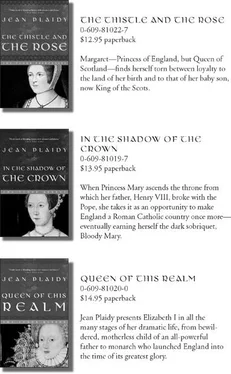Jean Plaidy - The Sixth Wife - The Story of Katherine Parr
Здесь есть возможность читать онлайн «Jean Plaidy - The Sixth Wife - The Story of Katherine Parr» весь текст электронной книги совершенно бесплатно (целиком полную версию без сокращений). В некоторых случаях можно слушать аудио, скачать через торрент в формате fb2 и присутствует краткое содержание. Жанр: Старинная литература, на русском языке. Описание произведения, (предисловие) а так же отзывы посетителей доступны на портале библиотеки ЛибКат.
- Название:The Sixth Wife: The Story of Katherine Parr
- Автор:
- Жанр:
- Год:неизвестен
- ISBN:нет данных
- Рейтинг книги:5 / 5. Голосов: 1
-
Избранное:Добавить в избранное
- Отзывы:
-
Ваша оценка:
- 100
- 1
- 2
- 3
- 4
- 5
The Sixth Wife: The Story of Katherine Parr: краткое содержание, описание и аннотация
Предлагаем к чтению аннотацию, описание, краткое содержание или предисловие (зависит от того, что написал сам автор книги «The Sixth Wife: The Story of Katherine Parr»). Если вы не нашли необходимую информацию о книге — напишите в комментариях, мы постараемся отыскать её.
The Sixth Wife: The Story of Katherine Parr — читать онлайн бесплатно полную книгу (весь текст) целиком
Ниже представлен текст книги, разбитый по страницам. Система сохранения места последней прочитанной страницы, позволяет с удобством читать онлайн бесплатно книгу «The Sixth Wife: The Story of Katherine Parr», без необходимости каждый раз заново искать на чём Вы остановились. Поставьте закладку, и сможете в любой момент перейти на страницу, на которой закончили чтение.
Интервал:
Закладка:
If all the young ladies at court dreaded the King’s attentions for fear of the consequences to themselves when they ceased to amuse him, the King’s ministers, remembering the disasters which had befallen their predecessors, also had their fears.
But the King was ageing; perhaps his sixth marriage would conent him; and as Lord Latimer had been a good Catholic, so, reasoned Gardiner, would his widow be also. If the King wished to marry the lady and if—as surely he must—he no longer expected children, Gardiner would welcome the match.
He said to Wriothesley when he obtained a private interview with that man: “What think you of this matter of the King and Lady Latimer?”
Sir Thomas Wriothesley, as zealous a Catholic as Gardiner himself and longing for promotion to the Chancellorship, was ready to agree with such an influential Catholic as Gardiner.
“The lady’s husband, recently dead, was a good Catholic,” said Wriothesley. “The lady was a dutiful wife to Latimer, and would be so to His Majesty, I doubt not.”
Gardiner came nearer. He liked Wriothesley as well as he liked any man; he liked him a good deal, for his liking depended on a man’s usefulness to himself.
“With a good Catholic Queen,” murmured Gardiner, “there would be one near him to whisper wisdom in the King’s ear.”
“And he needs such whispering,” said Wriothesley, “with the Seymours ever about him, paving the way for themselves with young Edward.”
Gardiner nodded and laid a hand on Wriothesley’s shoulders. “Audley looked sick today; I thought.”
They exchanged nods and smiles of understanding.
Wriothesley knew that if Audley became too sick for the post of Lord Chancellor, it would not be Gardiner’s fault if Sir Thomas Wriothesley did not receive the Great Seal.
Edward Seymour, Thomas’s elder brother, who was now Lord Hertford, being one of the chief Reformers, was aware of Katharine’s leaning toward the Party; so he, also, was not averse to the King’s marriage with Lady Latimer.
There was only one notable gentleman of the court who was against it. That was Sir Thomas Seymour himself. It seemed to him that the more Katharine became out of reach, the more desirable she became.
He thought longingly of her sweet comeliness, of her gentleness, her unspoiled nature—and her considerable possessions.
Sir Thomas Seymour was a very sad man as that blustering March of 1543 gave way to softer April.
THE YOUNG PRINCE EDWARD was entertaining his two sisters in his apartments.
He was not quite five years old, a palefaced, puny child, whose health was a source of great anxiety to all those who were responsible for him. It was their constant fear that he would die and that the King would punish them for his death.
His tutors feared either that he might overtax his brain or that he might not please his father with his learning. Those in charge of his physical training suffered even more acutely. They were apprehensive every time the little boy mounted a pony or played a game of tennis. But these things he must do, for the King wanted Edward to be another such as Bluff King Hal had been. At five, Henry had been a lusty boy, “pink and gold,” they had said of him, taller than his brother Arthur, outshining him in everything he did. He had been a Prince who looked a Prince, and that was the sort of Prince Edward must be.
Little Edward knew what was expected of him, for he was knowledgeable beyond his years. Sports tired him, but book-learning did not, and therefore he loved books. He could write Latin and read it fluently. He already knew that one day he must be the King, and a Tudor King. Wishing fervently to please his father and do all that was expected of him, he rigorously performed all his duties; but his greatest pleasure was in being with the younger members of his family, and in particular with his half-sister Elizabeth and her whom he called his cousin—little Jane Grey. He was sure that he loved Jane best of all. There were several reasons for this; Jane was nearer his age than the others, being barely a year older than he was. His sister Elizabeth, who was nine years old, was clever, but not in quite the same way as Jane was. Jane and he were of a kind; but Jane was beautiful and not made breathless by small exertions, as he was; her legs were fine and firm and could support her with the greatest ease; she had no pains in her head and there were no outbreaks of rashes on her delicate skin.
He was glad this was so. Jane was his dearest.
But he was greatly excited by the presence of his sister Elizabeth—perhaps more excited by her than by anyone else. Her sharp eyes were everywhere; she knew all the court gossip and would tell it, throwing back her mane of red hair and playing the parts of all the people who figured in the stories she told.
She looked for admiration while she talked, and nothing pleased her more than a compliment. Edward never forgot to admire her gown. She had asked him whether he thought Jane prettier than she was, and Edward found it very difficult to give a truthful answer to that, for a reply in the affirmative would have infuriated her; so he told her that as Jane was just a child and merely Lady Jane Grey, and she herself was grown up and a Princess, there could be no comparison.
Then Elizabeth had kissed him in her quick way and burst out laughing. She knew that he deceived her, but she did not mind that. She told him he was a clever little boy.
He was not so pleased to see his sister Mary, for she always saddened him. When she came into a room she seemed to bring sorrow with her. She was often ill, as he feared he was. Mary had been so ill a little while ago that it had been feared she would die. The King had not greatly cared what befell his elder daughter, but when his son was sick there were doctors all about the boy. His father, sparkling with jewels, looking bigger than anyone else in the world, would stump up and down the chamber, haranguing the doctors, threatening them—almost threatening Edward himself—if the Prince should die.
I dare not die! Edward often said to himself. I must not complain of this pain in my head. I must be a King, and a Tudor King. I am my father’s only male heir.
It was a great responsibility for such a small boy and such a frail one. No wonder he liked to sit in an alcove with Jane and talk to her of what he had read or what he had learned.
Yet it was pleasant to gaze at Elizabeth, with the color flaming under her pale skin, the freckles across her nose. Such a diplomatic Prince did not mention the freckles—although they pleased him— for Elizabeth’s women prepared lotions to make them disappear, as the vain creature imagined that they spoiled her lovely skin.
When she kissed him and told him he was her dearest brother, he could not be quite sure whether she was not remembering all the time that one day he would be the King and very important, and that she would need him to be kind to a Princess of uncertain birth.
Today she was excited. She had news.
She came in haughtily, as she did when the mood took her; and he fancied that she played a game of makebelieve in which she was a Queen and he her subject. With her came Mistress Ashley, her governess, whose life the Princess plagued, though the woman adored her.
Elizabeth was dressed in a new gown of which she was very proud, yet she was angry because she lacked jewels. She had told him that she wished for emeralds, because emeralds suited the color of her hair. He wished that he had emeralds that he might give her. When he was a King he would do so; but he hoped that would not be for a long time; he dreaded that day when he would have to be the King.
Now here was his sister, taking his hand and kissing it. “Nan Bullen’s girl,” he had heard her called; that was when people were angry with her. “Who is she?” they said then. “Who but Nan Bullen’s bastard.”
Читать дальшеИнтервал:
Закладка:
Похожие книги на «The Sixth Wife: The Story of Katherine Parr»
Представляем Вашему вниманию похожие книги на «The Sixth Wife: The Story of Katherine Parr» списком для выбора. Мы отобрали схожую по названию и смыслу литературу в надежде предоставить читателям больше вариантов отыскать новые, интересные, ещё непрочитанные произведения.
Обсуждение, отзывы о книге «The Sixth Wife: The Story of Katherine Parr» и просто собственные мнения читателей. Оставьте ваши комментарии, напишите, что Вы думаете о произведении, его смысле или главных героях. Укажите что конкретно понравилось, а что нет, и почему Вы так считаете.










